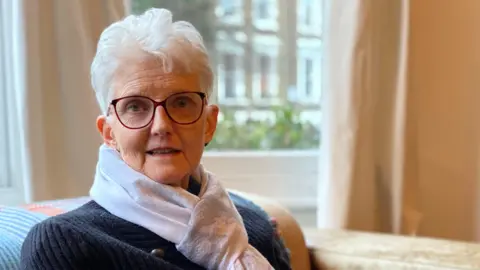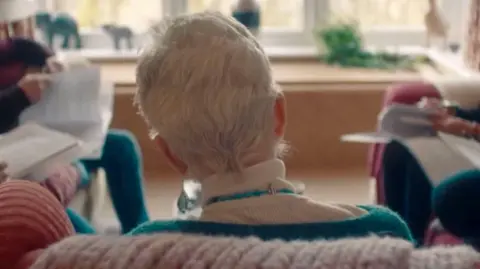
 BBC/Docsville Studios/Ellena Wood
BBC/Docsville Studios/Ellena Wood
Psychotherapist Gillie Jenkinson specialises in helping people who have left cults
For seven years of her twenties, Gillie Jenkinson was in a religious cult. She recalls being told what to eat, when to sleep and what clothes to wear.
"It was completely coercive, controlling," she says, going on to add that the group operated from an "ordinary" looking terraced house.
She remembers giving all of her money to the group, believing it would go towards their mission of "saving the world".
"None of that happened, we didn't save anybody or do anything with it, but you're sold a lie," she explains.
After leaving the cult, she sought mental health support to help process her experiences but she was unable to find any trained therapist with experience in helping cult survivors.
In the end, she decided to train as a therapist herself and has now been practising for around 30 years, specialising in helping people who have left cults.

 BBC/Docsville Studios
BBC/Docsville Studios
Jenkinson helps people who have left cults, including former members of the Jesus Army, a separate religious cult from the one she was involved in
This led her to appear in the two-part BBC documentary Inside the Cult of the Jesus Army, which sees her work with people brought up in the now-defunct religious cult to recognise cult dynamics and identify the group's impact on them.
The BBC revealed allegations of widespread child abuse in the group, which disbanded in 2019.
The Jesus Fellowship Community Trust, which has been winding up the group's affairs, said it was sorry for "the severely detrimental impact" on people's lives.
Speaking to the BBC, Jenkinson explains how to recognise a cult and why more support is needed for those who leave.
How do you spot a cult?
"It's not always easy to identify a cult," Jenkinson says, explaining that there isn't one type of person that joins a cult, they don't dress a certain way and they can operate from "ordinary" houses.
The Family Survival Trust (FST), a charity that offers support to those affected by cults, defines a cult as a system controlled by a charismatic and authoritarian leadership that is "rigidly bounded" and supported by a fixed set of beliefs. It involves brainwashing designed to isolate, control and exploit followers.
Cults do not have to be religious. Linguist Amanda Montell, author of Cultish: The Language of Fanaticism, explains people can "erect a cult around anything, as long as you can inject it with fear and an 'us-versus-them' mentality".
Montell adds that these groups don't even have to take place in person anymore and says they are becoming "easier" to find because of the internet, adding "so many cults do their recruiting online".

 BBC/Docsville Studios/Alamy Archive
BBC/Docsville Studios/Alamy Archive
The Jesus Army disbanded in 2019
While cults can be hard to spot, Jenkinson and Montell note some "red flags" people can look for:
- One possible indicator Jenkinson highlights is "love bombing" - a manipulation tactic that sees abusers use affection and declarations of love as a way of gaining power and control.
- Another common theme is promising "answers to life's very complex problems", like climate change or the meaning of existance, the psychotherapist adds.
- Montell says the combination of mantras, buzzwords and nicknames for insiders and outsiders of the group, as well as language that elicits a strong reaction while encouraging us not to ask further questions, can be indicators.
- The linguist adds that certain texts being "off-limits" in the group can also be a warning sign.
- The most "extreme" trait of a cult for Montell is a "high barrier to exit", meaning group members being made to feel they might lose their identity or friendships, or fear retaliation, if they leave the group.
What can you do if you think you're in a cult?
Jenkinson encourages people to listen to their "gut feeling" if they think something is wrong, to listen to critical voices and to investigate the group online. "It might save you years of pain," the psychotherapist says.
Jenkinson also strongly discourages relatives from giving a group money because it likely won't go to their loved one. However, she encourages family and friends to keep lines of communication open and to ask "genuine, critical thinking questions".
However, Jenkinson says greater support and understanding is needed for people who have left cults, explaining: "it needs destigmatising because people need help when they come out".
She adds that there should be provision within the NHS to offer specialist counselling for those leaving cults.
A spokesperson for the Department of Health and Social Care says as part of its 10-year health plan it "will increase access to talking therapies to support patients".
Jenkinson adds that changes to the law are "desperately" needed to protect those in cults. Currently in England and Wales, coercive control is illegal in intimate or family relationships. However, Jenkinson says this needs to be extended to include the coercive control that occurs in groups like cults.
A spokesperson for the Ministry of Justice says: "Cult leaders can already be prosecuted for a number of offences including fraud, false imprisonment or harassment."
- Details of organisations offering information and support with sexual abuse or child abuse are available at the BBC's Action Line.
You can watch part two of Inside the Cult of the Jesus Army on BBC Two Sunday 3 August at 21:00 BST or both episodes are available on BBC iPlayer now.

 18 hours ago
4
18 hours ago
4









